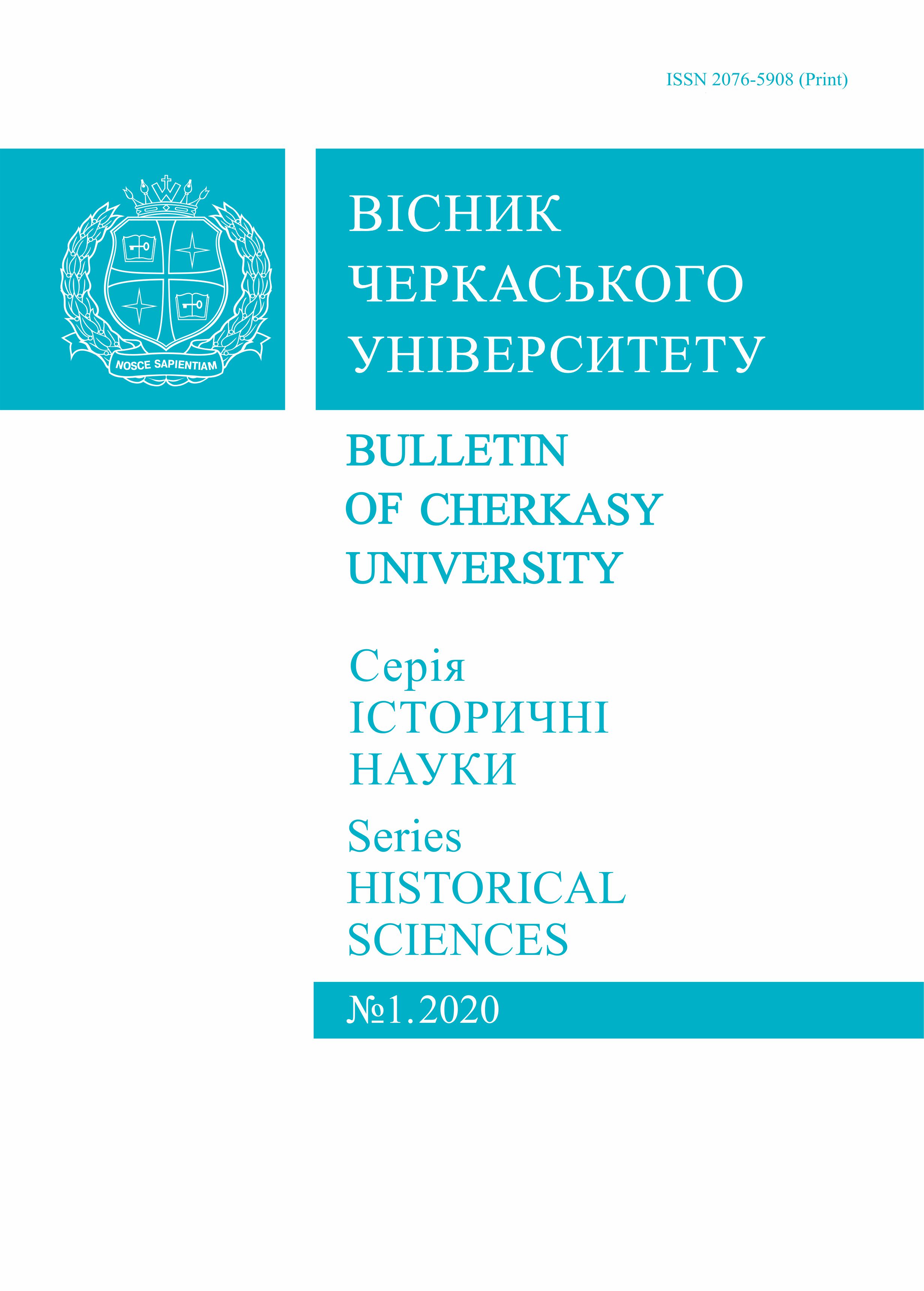Unification act and its Consequences in Assessments of Representatives of the Ukrainian Public and Political Thought of the First Half of the XX сentury
##plugins.themes.bootstrap3.article.main##
Анотація
Abstract. Introduction. Among the most difficult problems facing the Ukrainian society, the problem of uniting all the Ukrainian people around the main challenges of the present and vision of the future of Ukraine ranks high. Therefore, a comprehensive study of the problem of unity does not lose its relevance both in the present context and in historical perspective despite the existence of a large number of works on the mentioned problematics.
Purpose. To highlight the views of the iconic representatives of the Ukrainian public and political thought of the first half of the ХХ century on the Act Zluky, to reveal their vision of the consequences of this event and considerations on the reasons of both the declarative character of the Act Zluky and unrealized unity intentions in general.
Results. Like the idea of the Ukrainian unity in general, the Act Zluky and its consequences were extremely significant issues in the ideological and political discourse of the Ukrainian public and political thought of the revolutionary period and post-revolutionary period. According to analysis of the sources, national intellectuals perceived the unity not only as the idea of territorial unification of Ukrainian lands into a single state, but also as the creation of a “unified national body” that unites the territorial unity and political, spiritual and socio-cultural consolidation of the Ukrainian nation. They believed that the reason of the failure to implement the unity idea was primarily related to the historically formed disunity of two parts of the Ukrainian people, lack of coordination in actions of Ukrainian forces political forces and prevalence of the regional interest over the national one.
Originality. A wide range of various, sometimes non-traditional and contradictory assessments of the Act Zluky and its consequences expressed by public, political and scientific figures of the Trans-Dnieper Ukraine and West Ukraine has been shown, a comparative analysis of their views on the causes of the defeat in the fight for an independent united Ukrainian state has been performed.
Conclusion. Social and political realities of the present give grounds to say that the Ukrainian society as a singleness moved ahead not too far in the understanding of its real unity and actual unification. So, there is still a vital task to set aspirations for unity in the broadest sense of this notion and then lay out scientific and theoretical concepts taking into account the multifaceted historical experience, including intellectual works by the Ukrainian national figures of the first half of the XX century.
##plugins.themes.bootstrap3.article.details##
Посилання
Yefremov, S. (1919). Spirit of Ages. Nova Rada (New Council), 25 January (in Ukr.).
Vynnychenko, V. (1990). Revival of the Nation. P. ІІІ. (reprinted reproduction of the edition, 1920). Kyiv: Politvydav Ukrainy (in Ukr.).
Bryk, О. (1969). A Thorny Path of the Ukrainian Government (1918–1921). Winnipeg (in Ukr.).
Mazepa, І. (2003). Ukraine in the Fire and Storm of the Revolution. – Kyiv: Tempora (in Ukr.).
Shapoval, М. (1927). The Great Revolution and Ukrainian Liberation Program (Сreated Lectures in America). Prague (in Ukr.).
Hoshuliak, І. (1999). Universal of the Unity and its Historical Significance. Ukrainian Unity: idea, experience, problems (Devoted to the 80th anniversary of the Act Zluky dated 22 January 1919): Collection. Kyiv: I.F. Kuras Institute of Political and Ethnic Studies of the National Academy of Sciences of Ukraine, 22-42 (in Ukr.).
Chumachenko, О. А. (2014). Mykyta Shapoval among SRs’ Beliefs and Political Realities (January to April, 1919). Istorychni studii suspilnoho prohresu (Historical Studies of Social Progress), 2, 20-26 (in Ukr.).
Shapoval, М. (1932). 22 January. Trudova Ukraina (Labour Ukraine), 5-6, 10 (in Ukr.).
Khrystiuk, P. (1922). Notes and Materials to the History of the Ukrainian Revolution. 1917–1920. V. ІV. W/o pl. (in Ukr.).
Lypynskyi, V. К. (2003). Before Dmytro Hreholynskyi. 16. ХІІ. 1924. In Ya. Pelenskyi (Ed.). V. К. Lypynskyi Complete Works, Archive, Studios. In R. Zalutskyi, Kh. Pelenska (Ed.). V. 1: Correspondence (from letter «А» to letter «Zh»). Kyiv; Philadelphia: Smoloskyp, 414-420 (in Ukr.).
Lypynskyi, V. К. (1995). Letters to Fellow Farmers: the idea and organization of Ukrainian monarchism. In Ya. Pelenskyi (Ed.). V. К. Lypynskyi Complete Works, Archive, Studios. V. 6. B. 1. Kyiv; Philadelphia (in Ukr.).
Deivis, N. (2001). Europe. History. Тransl. from Engl. P. Tarashchuk, О. Kovalenko. Kyiv: Solomiia Pavlychko Publishing House «Osnovy» (in Ukr.).
Lysiak-Rudnytskyi, І. (1994). The Ukrainian National Council and Idea of Unity. І. Lysiak-Rudnytskyi. Historical Essay. In 2 vol. Тransl. from Engl. М. Badik, U. Havryshkiv, Ya. Grytsaka et al. V. 2. Kyiv: Osnovy, 271-283, (in Ukr.).
Rudnytskyi, S. (1994). Galicia and Unity of Ukraine. Compiler, preface by О. І. Shablii. Why do we Want an Independent Ukraine? Lviv: Svit, 350 411 (in Ukr.).
Levytskyi, D. (1925). Act Zluky dated 22 January 1919. Dilo (Business), 22 January (in Ukr.).
Omelchenko, О. V., Soliar, І. Ya. (2011). 22 January 1918 and 1919 in the national memory of the Galician Population within the Inter-War Period of the XX century. Achievements in the Creation of the State and Civilizational Achievements of the Ukrainian people. National and Historical Memory. Collection of scientific papers. Issue 1. Kyiv: Stylos, 259-270 (in Ukr.).
Bochkovskyi, О. І. (1991-1992). Introduction to Science of the Formation and Development of the Nation. Munich (in Ukr.).

